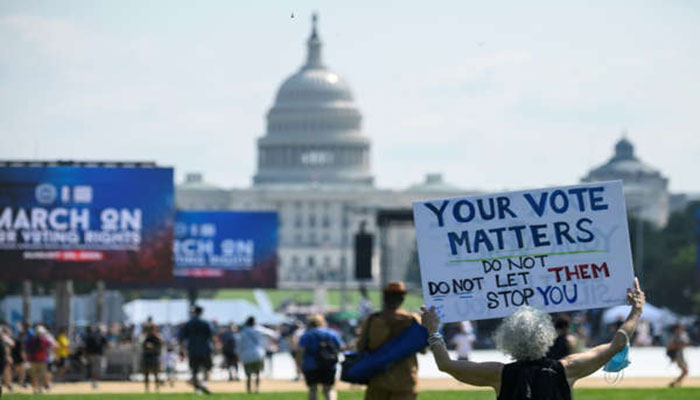Thousands join US protests against laws curbing voting rights
WASHINGTON: Tens of thousands of people were rallying on Saturday in Washington and dozens of other US cities to protest against laws in several Republican-led states that critics say will make it harder for minorities to vote.
The date selected for the rallies -- in cities from Seattle to Atlanta -- was not picked at random: It was on August 28, 1963 that a quarter-million people descended on Washington for a massive civil rights rally highlighted by the Reverend Martin Luther King Jr.’s famous "I have a dream" speech.
"We will make history on Saturday" by picking up "the torch for justice my father and so many others carried," said the rights leader’s son Martin Luther King III, one of several speakers slated to address the rally in Washington. People began gathering early in the capital city under a blazing sun.
"I just feel like we just kind of went backwards," said Rikkea Harris, a 25-year-old student who had traveled from Colorado with her father, Rickey Harris, to take part in the rally.
Americans should "do their part in trying to knock down all these voting suppression laws that they’re putting in across the country," said Rickey Harris, who is 65.
In 1965 the US Congress adopted the Voting Rights Act, meant to ban discriminatory election measures.
But some states, mainly in the South, nonetheless passed often technical changes that ultimately made it harder for African Americans -- who tend to be reliably Democratic -- to vote.
That process accelerated sharply as Donald Trump hammered away at the unsubstantiated allegation that massive voting fraud had cost him victory in the November 2020 presidential election.
Since January, at least 18 states have adopted a total of 30 restrictive election laws, with dozens of others under consideration, according to the Brennan Center for Justice, a nonprofit public policy institute.
Those laws range from a requirement to have a fixed address in order to register to vote to a ban on the drive-through voting that was popular in some states last year amid the Covid-19 pandemic.
Organizers of Saturday’s protests, who have denounced what they called "racist, anti-democratic voter suppression laws," are demanding that the US Congress pass legislation to block such voting restrictions.
The Democratic-controlled House of Representatives has passed two draft laws to limit such restrictions, but they are given virtually no chance of passing the closely divided Senate.
On this day last year, thousands of people gathered in Washington to mark the 1963 anniversary and to demand -- only months after the killing of George Floyd in Minneapolis -- an end to police violence against African Americans.
-
 18-month Old On Life-saving Medication Returned To ICE Detention
18-month Old On Life-saving Medication Returned To ICE Detention -
 Cardi B Says THIS About Bad Bunny's Grammy Statement
Cardi B Says THIS About Bad Bunny's Grammy Statement -
 Major Hollywood Stars Descend On 2026 Super Bowl's Exclusive Party
Major Hollywood Stars Descend On 2026 Super Bowl's Exclusive Party -
 Sarah Ferguson's Silence A 'weakness Or Strategy'
Sarah Ferguson's Silence A 'weakness Or Strategy' -
 Garrett Morris Raves About His '2 Broke Girls' Co-star Jennifer Coolidge
Garrett Morris Raves About His '2 Broke Girls' Co-star Jennifer Coolidge -
 Winter Olympics 2026: When & Where To Watch The Iconic Ice Dance ?
Winter Olympics 2026: When & Where To Watch The Iconic Ice Dance ? -
 Melissa Joan Hart Reflects On Social Challenges As A Child Actor
Melissa Joan Hart Reflects On Social Challenges As A Child Actor -
 'Gossip Girl' Star Reveals Why She'll Never Return To Acting
'Gossip Girl' Star Reveals Why She'll Never Return To Acting -
 Chicago Child, 8, Dead After 'months Of Abuse, Starvation', Two Arrested
Chicago Child, 8, Dead After 'months Of Abuse, Starvation', Two Arrested -
 Travis Kelce's True Feelings About Taylor Swift's Pal Ryan Reynolds Revealed
Travis Kelce's True Feelings About Taylor Swift's Pal Ryan Reynolds Revealed -
 Michael Keaton Recalls Working With Catherine O'Hara In 'Beetlejuice'
Michael Keaton Recalls Working With Catherine O'Hara In 'Beetlejuice' -
 King Charles, Princess Anne, Prince Edward Still Shield Andrew From Police
King Charles, Princess Anne, Prince Edward Still Shield Andrew From Police -
 Anthropic Targets OpenAI Ads With New Claude Homepage Messaging
Anthropic Targets OpenAI Ads With New Claude Homepage Messaging -
 US Set To Block Chinese Software From Smart And Connected Cars
US Set To Block Chinese Software From Smart And Connected Cars -
 Carmen Electra Says THIS Taught Her Romance
Carmen Electra Says THIS Taught Her Romance -
 Leonardo DiCaprio's Co-star Reflects On His Viral Moment At Golden Globes
Leonardo DiCaprio's Co-star Reflects On His Viral Moment At Golden Globes




